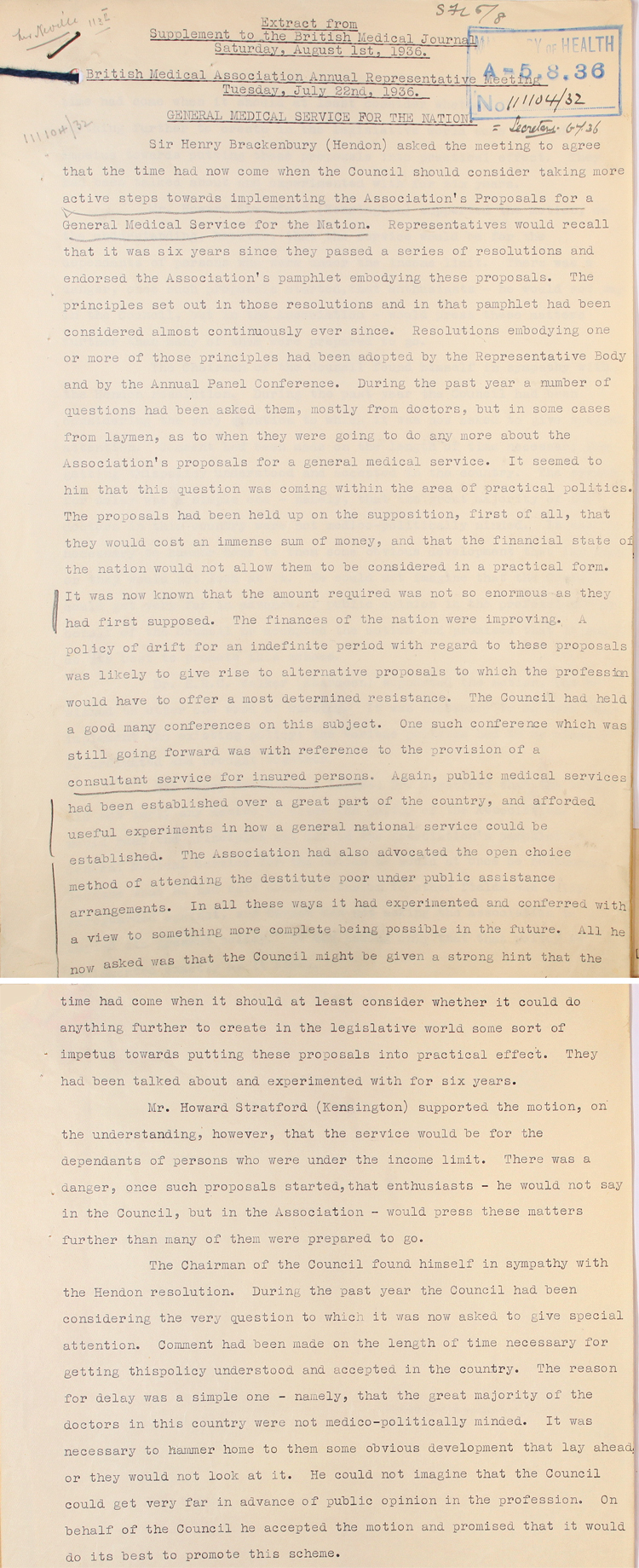
Extract from notes on British Medical Association annual meeting, 22nd July 1936 (MH 58/338)
Transcript
Extract from Supplement to the British Medical Journal
Saturday, August 1st, 1936
British Medical Association Annual Representative meeting
Tuesday, July 22nd, 1936
GENERAL MEDICAL SERVICE FOR THE NATION
Sir Henry Brackenbury (Hendon) asked the meeting to agree that the time had now come when the Council should consider taking more active steps towards implementing the Association’s Proposals for a General Medical Service for the Nation. Representatives would recall that it was six years since they passed a series of resolutions and endorsed the Association’s pamphlet embodying these proposals. The principles set out in those resolutions and in that pamphlet had been considered almost continuously ever since. Resolutions embodying one or more of those principles had been adopted by the Representatives Body and by the Annual Panel Conference. During the past year a number of questions have been asked them, mostly from doctors, but in some cases from laymen, as to when they were going to any more about the Association’s proposals for a general medical service. It seemed to him that this question was coming within the area of practical politics. The proposals had been held up on the supposition, first of all, that they would cost an immense amount of money, and that the financial state of the nation would not allow them to be considered in a practical form. It was now known that the amount required was not so enormous as they first supposed. The finances of the nation were improving. A policy of drift for an indefinite period with regard to these proposals was likely to give rise to alternative proposals to which the profession would have to offer a most determined resistance. The Council had held a good many conferences on this subject. One such conference which was still going forward was with reference to the provision of a consultant service for insured persons. Again, public medical services had been established over a great part of the country, and afforded useful experiments in how a general national service could be established. The Association had also advocated the open choice method of attending the destitute poor under public assistance arrangements. In all these ways it had experimented and conferred with a view to something more complete being possible in the future. All he now asked was that the council might be given a strong hint that the time had come when it should at least consider whether it could do anything further to create in the legislative world some sort of impetus towards putting these proposals into practical effect. They have been talked about and experimented with for six years.
Mr. Howard Stratford (Kensington) supported the motion, on the understanding, however, that the service would be for the dependents of persons who were under the income limit. There was a danger, once such proposals started, that enthusiasts – he would not say in the Council, but in the Association – would press these matters further than many of them were prepared to go.
The chairman of the Council found himself in sympathy with the Hendon resolution. During the past year the Council had been considering the very question to which it was now asked to give special attention. Comment had been made on the length of time necessary for getting this policy understood and accepted in the country. The reason for delay was a simple one – namely, that the great majority of the doctors in this country were not medico-politically minded. It was necessary to hammer home to them some obvious development that lay ahead or they would not look at it. He could not imagine that the Council could get very far in advance of public opinion in the profession. On behalf of the Council he accepted the motion and promised that it would do its best to promote the scheme.
